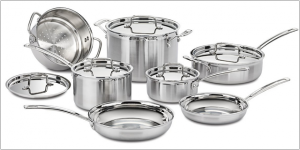Stainless steel pots and pans offer attractive manufacture complete with
offer attractive manufacture complete with
a protective coating enabling the stainless finish.
It boasts the weight and durability vital for commercial use and can be used
to cook any type of food.
This increases versatility without any risk of reaction to acidity or alkalinity.
Here we offer some basic care tips to maximise the lifespan of your stainless steel cookware!
Despite popular belief, stainless steel rusts similarly to other metals if not cared for and cleaned appropriately. If the protective layer is compromised then rust and corrosion will occur. Appearing in most kitchens, it's vital to understand the correct methods of care and maintenance to boost your cookware's lifespan.
Do's
- Use warm soapy water and a soft cloth to clean pans. The mild detergent will not act as an abrasive on the coating and the soft cloth will not cause scratches or marks.
- For more stubborn, baked on dirt try soaking the pan in boiling water to soften and loosen the grime. If this still doesn’t bring your pans back to a glistening shine you can try using a mixture of water and a little baking soda mixed into a paste.
- Once your stainless steel pans are spotlessly clean you should always rinse with water to remove any soap or cleaning detergent residue. A build-up of these mild chemicals will, over time, have a negative effect on the durability of your stainless steel cookware.
- Dry the pots and pans immediately after cleaning to prevent any water spots from forming. These water spots will affect the protective layer if not removed.
- If you find that you have stubborn water spots or fingerprints on your stainless steel items, use a little vinegar with a soft cloth to wipe the offending areas. Fingerprints will house natural oils which can slowly decrease the protective layer over time. Always wipe stainless steel in the direction of the finish to achieve the best results.
Don’ts
- Don’t run pots through the dishwasher however tempting this may seem during busy services. Although it may survive the cycle, handwashing is recommended.
- Steer clear of steel wool or highly abrasive pads as these will leave scratches and thinning of the protective coating leaving your cookware prone to rusting.
- Never use bleach or products that contain even a small amount of bleach. This will cause discolouration of the metal and may weaken the protective layer.
- Try to avoid stacking your cookware after use either when waiting to be cleaned or once in storage. Stacking can cause unnecessary scratches therefore it is recommended to hang your stainless steel cookware whenever possible.
Equipping a commercial kitchen with a full range of premium cookware can prove costly, therefore understanding how to properly care for pieces will not only save you money in the future but will guarantee that your kitchen is always capable of achieving outstanding results.






